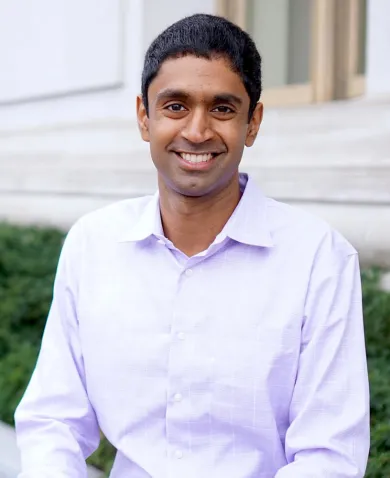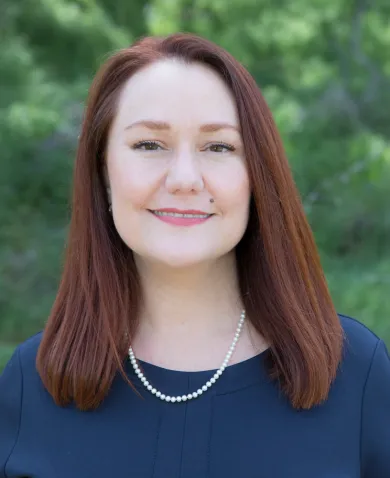April 23, 2018
Getting an MBA doesn’t always lead to a lifelong career in business. Some alumni are turning to politics in hopes of making their message heard and creating change. We caught up with two candidates to ask them more about the intersection of business and politics.
Rachel Payne, MBA ’04, is the CEO and cofounder of Prizma and FEM inc. She is a Democrat running for U.S. Congress in Orange County, California. Payne has a 20-year technology background at companies including eBay and at Google, where she was a senior executive for eight years. At Google, she helped build a technology ecosystem in Sub-Saharan Africa and led a team to create mobile apps for the poor.
Vivek Viswanathan, JD/MBA ’13, is running for California state treasurer, also as a Democrat. Viswanathan worked on Hillary Clinton’s 2016 presidential campaign and recently served as a special advisor to the office of California governor Jerry Brown.
What made you want to run for office?

Vivek Viswanathan is running for California state treasurer. | Photo courtesy of Annie Khoa
Viswanathan: When I graduated from Stanford GSB in 2013, I knew that I wanted to work in policy and politics. At Stanford GSB, I had the chance to take classes on financial policy, regulatory policy, capital markets — core economic issues that affect everything that we do.
After I graduated, I joined the Hillary Clinton campaign, and of course the result was devastating for those of us who supported her. That led to the question of what to do next. I realized that, as important as that campaign was, it was now more important than ever to stay in politics.
Payne: I’ve been in the tech sector for 20 years, and the theme of my work has always been how technology can improve people’s lives, especially the most vulnerable and those traditionally excluded. My decision to run for Congress was more a sense of responsibility: I had donated to causes, petitioned, participated in marches, set up a new Democratic Club in Orange County, and it still wasn’t enough. I realized that if we really want to change the U.S. House of Representatives, we need to change who represents us.
How is being an entrepreneur similar to running for office?

Rachel Payne is running for running for U.S. Congress in Orange County, California. | Photo courtesy of Rachel Payne
Payne: I’m surprised by how many skills are transferable from the private sector generally and from being an entrepreneur in particular. Entrepreneurs have to read the market, pivot quickly, respond to shifting dynamics, and be versatile, resilient, and resourceful. All of those rules apply in campaigns. Being an entrepreneur allows you to move quickly to make sure that you’re able to absorb a lot of data and satisfy the needs of your voters. This applies not only to local issues but also to the ability to take into account multiple, often competing, points of view in order to formulate effective policies. As a person who has negotiated term sheets, I know that sometimes the best outcome is a compromise for everyone. Especially as a CEO, it’s rarely the case that you don’t have to compromise. And policy is similar.
Viswanathan: Yes and that point brings to mind an old saying in government, that I think is true at every level: “You show me what your budget is, and that shows me what your values are.” Business is like politics in the sense that they’re both about making sure budgets and resource allocation are aligned with values and future goals — in my case, for the State of California.
What conversations should we be having about business and policy that we aren’t?
Payne: Right now, America is on its back foot when it comes to technology policy, whether it’s cybersecurity, the integrity of our elections, and the proliferation of fake news. Or, as we’ve seen recently, the issue of user privacy and user data protection. These are frontier issues of public policy.
Viswanathan: Yes, that’s such a good point. Politics often proceeds in these very short 24-hour news cycles, but the issues that are really important often happen over 5, 10, 20 years. It takes farsighted politicians to take account of those and provide solutions.
In my case, thinking about California’s economic future and the way we’ve structured our budget and revenue system — it’s strong, but it’s very volatile and very tied to the stock market. We have to think about how to update that for a 21st-century service-based economy.
Payne: As we look ahead over the next few years, I think the three most important potential existential threats are nuclear war, climate change, and the rise of artificial intelligence. We don’t have a policy framework in place today to deal with artificial intelligence at all, both the good and the bad. With the rise of automation, I’m concerned about the lack of investment and focus on how to help the labor force transition into new jobs in emerging growth sectors.
Viswanathan: That makes me think about another important aspect where business and politics intersect, and that’s with trust. Trust is so important in politics and so important in business. Joel Peterson, whose class I took at Stanford GSB, just published The 10 Laws of Trust: Building the Bonds That Make a Business Great, a book on how trust can take years to build and how it can be lost in an instant.
Payne: Absolutely.
Viswanathan: I have a question for you, Rachel. We’re both first-time candidates — it was a big step to take the plunge, round up support, and start raising money. I’ve been thinking back to my Stanford GSB days and the idea of not knowing where something is going to go, but believing that it’s important and drawing the support, even if you don’t know what the result will be. I’m curious; what has your experience been like?
Payne: Yes, it is a big jump! One of my challenges is that I’m the only technologist in the race. As a woman, it’s interesting because I have a lot more work experience than many of the people running, and yet I’m the one being told that I need to wait my turn, let the guys win, I can go next time, I’m too young — even though I’m not.
But if you’ve been a woman in tech, you’ve learned how to develop a thick skin when people tell you not to do something. It makes you double down to do it even better. I’m learning that politics has similar dynamics to what you see in a crowded, competitive market. But at the same time, “dirty politics” is real, and this arena can have a bit less integrity and honesty, which is unfortunate.
Which classes, professors, or lessons from Stanford GSB are you calling on now?
Viswanathan: I can think of a few classes that made an impact for me: Debt Markets with Darrell Duffie was definitely one. Stanford GSB is such a good mix of hard skills and soft skills and Duffie drilled the concept of bond duration into us like no one else could have. Whenever I’m looking at California’s bond portfolio — so much of that started in his class.
One thing that was fascinating about my Stanford GSB experience is that a number of my classes were taught by Republicans, Keith Hennessey, Edward Lazear, and Condoleezza Rice. Even though those professors support policies that are different from the ones I support, the experience made me a stronger thinker. It gave me a rigor in terms of how I think about policy.
Payne: For me it was George Parker’s corporate finance class. He was always delivering gems of wisdom. One line he used to say that’s hitting home right now is “Where you stand depends on where you sit.” If you know why a person has a certain position, it helps you understand so much more about him. George’s advice has always stayed with me.
There’s also the Stanford GSB lesson of managing with resilience. When things get really hard, you have to be the one who stays strong and leads your team, whether it’s the campaign team or your company.
What has really lifted me is the support of the Stanford GSB community. A few weeks ago, members of my class hosted a big fundraiser for me. The turnout was spectacular and we raised a lot of money. They were proud to see one of their classmates running for office and being part of the journey, which was so heartening for me. That’s the community that continues to sustain me to this day.
—Jenny Luna
The following is a partial list of other alumni involved in government:
- Adam Anderson, MBA ’08 (candidate for superintendent of public instruction in California)
- Tim Briglin, MBA ’95 (member of the Vermont House of Representatives)
- John Browne, MS ’81 (member of the House of Lords, U.K. Parliament; currently on leave)
- Doug Burgum, MBA ’80 (governor of North Dakota)
- Marco Chan, MBA ’16 (policy adviser in the LGBTQ2 Secretariat of Canada)
- Beth Cobert, MBA ’84 (former deputy director for management and U.S. chief performance officer, Office of Management and Budget; former acting director, U.S. Office of Personnel Management)
- Peter Coneway, MBA ’69 (former U.S. ambassador to Switzerland and Liechtenstein)
- Leandro Cuccioli, MBA ’06 (federal administrator of public revenues in Argentina; former secretary of financial services in the Ministry of Finance in Argentina; former coordinator of public policies in the Ministers’ Chief of Cabinet Office in Argentina)
- Dave Dodson, MBA ’87 (candidate for U.S. senator from Wyoming)
- Sebastián Echeverría, MS ’15 (former member of the Ministry of Social Development in Chile)
- Ryūta Ibaragi, MBA ’95 (governor of Okayama Prefecture, Japan)
- Richard Kolbe, MBA ’67 (former member of the U.S. House of Representatives from Arizona)
- Jason Lorber, MBA ’95 (former member of the Vermont House of Representatives)
- Penny Pritzker, MBA/JD ’85 (former U.S. Secretary of Commerce)
- Nicolás Shea, MS ’09 (former candidate for president of Chile)
- Jim Shelton, MBA ’93 (former deputy secretary of the U.S. Department of Education)
- John Suddarth, MBA ’90 (candidate for member of the U.S. House of Representatives from Virginia)
- Rishi Sunak, MBA ’06 (member of the House of Commons, U.K. Parliament)
- Steve Westly, MBA ’83 (former controller of California; former candidate for governor of California)
- Hidehiko Yuzaki, MBA ’95 (governor of Hiroshima Prefecture, Japan)
Are you or one of your former classmates running for office and/or previous office-holders/appointees, and not on this list? Let us know by sending an email to alumni@gsb.stanford.edu and we’ll update our list.
For media inquiries, visit the Newsroom.



